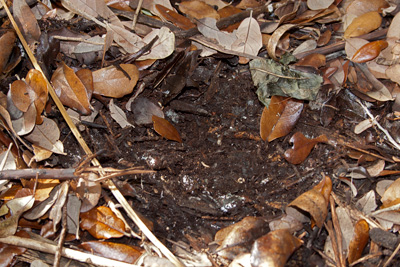Learning to love leaf litter

BY KENNETH SETZER
FAIRCHILD TROPICAL BOTANIC GARDEN
As published in the Miami Herald, 2/15/14
The health benefits of yard work and gardening are legion: a cardiovascular workout, increased muscle strength, joint flexibility and an improved mood.
Gardening gives you a feeling of accomplishment and peace of mind, and it’s not just your imagination. Studies have observed that a bacterium common in soil — Mycobacterium vaccae — may affect levels of the neurotransmitter serotonin, which has been shown to be involved with controlling mood, appetite and sleep. Many prescription antidepressants attempt to modulate serotonin in the brain to help alleviate depression and anxiety.
And a clean garden is a healthy garden, right?
Not necessarily. There are some good reasons for leaving the leaf litter where it falls, including not only the leaves but small twigs, needles, flowers, etc.
First, if you rake an area clean down to the soil, it should come as no surprise that weeds will occupy that space in no time. This will lead to — you guessed it — more yard work for you. Mulch can help block out the weeds, but that involves even more work, and expense.
Take a walk in the woods, and what do you see covering the ground? Leaves! If you allow leaf litter to accumulate on bare ground, you can replicate nature’s mulch. It is free, it blocks weeds and it just appears courtesy of your trees and plants, no hauling from the garden store needed.
Leaf litter also provides shelter for fossorial creatures, i.e. those that like to burrow or stay close to the soil like millipedes and woodlice. These animals help in keeping the soil aerated and serve as food for other animals. Some, like earthworms, actually help create the soil itself.
Leaf litter also aids in maintaining soil moisture by protecting soil from drying winds, and by slowing rainwater runoff to give it time to seep into the ground (except in some cases of very large leaves compacted in dense conditions).
Decomposing leaf litter supplies carbon and other nutrients to the soil, thus nourishing nitrogen-fixing bacteria, a vital source of fertility for plants. The breakdown of organic matter may also act as food for beneficial fungi that form symbiotic relationships with plant and tree roots. So ultimately, the decomposed leaf litter nutrients are reabsorbed into the plants and trees they originally came from — a near-perfect system of self-fertilization, so efficient.

The rich world under leaf litter. Kenneth Setzer/FTBG.
Want more evidence that a too-clean garden isn’t the best? The cacao tree (Theobroma cacao), from which chocolate derives, is pollinated by a tiny fly. The fly reproduces in fallen, rotting cacao pods and requires the humidity decaying detritus encourages, plus they do not like to traverse the open, clear spaces created by over-maintained cacao plantations. If the cacao pods and litter are cleaned up, there will be no flies, no pollination, and no chocolate.
The microclimate created just under the surface of leaf litter acts like a compost bin, keeping things warm and damp to speed decay and create humus-rich soil. This is more evident the closer one gets to the tropics, where decay is hastened. If you live in more temperate areas, your leaf litter will take longer to decompose back into the soil.
If you need to keep things under control, remove just the top layer of litter for composting or disposal, though I bet this won’t be necessary, especially during our summers. However keep in mind that wet leaves and associated plant litter are slippery and staining, so keep them off pavement.
Overzealous yard maintenance can also harm your plants more directly. As parts of a plant age, such as palm fronds, the tree move nutrients from the old frond for use in younger parts. If you cut off the frond too soon, you deprive the tree of nutrients. Wait until it’s completely brown before removal.
Let’s not forget how beneficial gardening is to us, physically and mentally. Just let things get a little messy and you improve your soil chemistry while saving yourself a backache by simply doing nothing.
